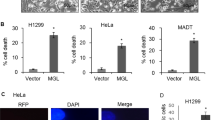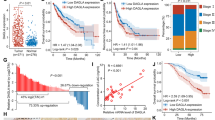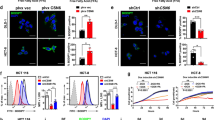Abstract
Human monoglyceride lipase (MGL) is a recently identified lipase and very little is known about its regulation and function in cellular regulatory processes, particularly in context to human malignancy. In this study, we investigated the regulation and function of MGL in human cancer(s) and report that MGL expression was either absent or reduced in the majority of primary colorectal cancers. Immunohistochemical studies showed that reduction of MGL expression in the colorectal tumor tissues predominantly occurred in the cancerous epithelial cells. MGL was found to reside in the core surface of a cellular organelle named ‘lipid body’. Furthermore, it was found to interact selectively with a number of phospholipids, including phosphatidic acid and phosphoinositol(3,4,5)P3, phosphoinositol(3,5)P2, phosphoinositol(3,4)P2 and several other phosphoinositides, and among all phosphoinositides analyzed, its interaction with PI(3,4,5)P3 was found to be the strongest. In addition, overexpression of MGL suppressed colony formation in tumor cell lines and knockdown of MGL resulted in increased Akt phosphorylation. Taken together, our results suggest that MGL plays a negative regulatory role in phosphatidylinositol-3 kinase/Akt signaling and tumor cell growth.
This is a preview of subscription content, access via your institution
Access options
Subscribe to this journal
Receive 50 print issues and online access
$259.00 per year
only $5.18 per issue
Buy this article
- Purchase on Springer Link
- Instant access to full article PDF
Prices may be subject to local taxes which are calculated during checkout






Similar content being viewed by others
Abbreviations
- MGL:
-
monoglyceride lipase
- PdtIns:
-
phosphatidylinositol.
References
Jemal A, Siegel R, Ward E, Hao Y, Xu J, Murray T et al. Cancer statistics. CA Cancer J Clin 2008; 58: 71–96.
Fearon ER . Molecular genetics of colorectal cancer. Annu Rev Pathol 2011; 6: 479–507.
Rustgi AK . The genetics of hereditary colon cancer. Genes Dev 2007; 21: 2525–2538.
Liu C, Crawford JM . The gastrointestinal tract. In: Kumar V, Abbas AK, Fausto N (eds) Pathologic Basic of Disease, 7th edn. Elsevier Inc: Philadelphia, PA, 2005, pp 797–875.
Duan RD . Phospholipid signals and intestinal carcinogenesis. J Food Nutr 2006; 50 (Suppl. 2): 45–53.
Kennedy BP, Soravia C, Moffat J, Xia L, Hiruki T, Collins S et al. Overexpression of the nonpancreatic secretory group II PLA2 messenger RNA and protein in colorectal adenomas from familial adenomatous polyposis patients. Cancer Res 1998; 58: 500–503.
Dueck DA, Chan M, Tran K, Wong JT, Jay FT, Littman C et al. The modulation of choline phosphoglyceride metabolism in human colon cancer. Mol Cell Biochem 1996; 162: 97–103.
Karakas B, Bachman KE, Park BH . Mutation of the PIK3CA oncogene in human cancers. Br J Cancer 2006; 94: 455–459.
Yuan TL, Cantley LC . PI3K pathway alterations in cancer: variations on a theme. Oncogene 2008; 27: 5497–5510.
Accioly MT, Pacheco P, Maya-Monteiro CM, Carrossini N, Robbs BK, Oliveira SS et al. Lipid bodies are reservoirs of cyclooxygenase-2 and sites of prostaglandin-E2 synthesis in colon cancer cells. Cancer Res 2008; 68: 1732–1740.
Nomura DK, Long JZ, Niessen S, Hoover HS, Ng SW, Cravatt BF . Monoacylglycerol lipase regulates a fatty acid network that promotes cancer pathogenesis. Cell 2010; 140: 49–61.
Sheridan AM, Force T, Yoon HJ, O’Leary E, Choukroun C, Taheri MR et al. PLIP, a novel splice variant of Tip60, interacts with group IV cytosolic phospholipase A(2), induces apoptosis, and potentiates prostaglandin production. Mol Cell Biol 2001; 21: 4470–4481.
Li J, Al-Khalili O, Ramosevac S, Eaton DC, Denson DD . Protein–protein interaction between cPLA2 and splice variants of alpha-subunit of BK channels. Am J Physiol Cell Physiol 2010; 298: C251–C262.
Prévost N, Mitsios JV, Kato H, Burke JE, Dennis EA, Shimizu T et al. Group IVA cytosolic phospholipase A2 (cPLA2α) and integrin αIIbβ3 reinforce each other's functions during αIIbβ3 signaling in platelets. Blood 2009; 113: 447–457.
Huang Y, He Q, Hillman MJ, Rong R, Sheikh MS . Sulindac sulfide-induced apoptosis involves death receptor 5 and the caspase 8-dependent pathway in human colon and prostate cancer cells. Cancer Res 2000; 61: 6918–6924.
Rong R, Montalbano J, Jin W, Zhang J, Garling M, Sheikh MS et al. Oncogenic Ras-mediated downregulation of Gadd 153/CHOP is required for Ras-induced cellular transformation. Oncogene 2005; 24: 4867–4872.
Acknowledgements
This work was supported by NIH Grants DK062136 and CA121850 to YH.
Author information
Authors and Affiliations
Corresponding author
Ethics declarations
Competing interests
The authors declare no conflict of interest.
Additional information
Supplementary Information accompanies the paper on the Oncogene website
Supplementary information
Rights and permissions
About this article
Cite this article
Sun, H., Jiang, L., Luo, X. et al. Potential tumor-suppressive role of monoglyceride lipase in human colorectal cancer. Oncogene 32, 234–241 (2013). https://doi.org/10.1038/onc.2012.34
Received:
Revised:
Accepted:
Published:
Issue Date:
DOI: https://doi.org/10.1038/onc.2012.34
Keywords
This article is cited by
-
Research progress on FASN and MGLL in the regulation of abnormal lipid metabolism and the relationship between tumor invasion and metastasis
Frontiers of Medicine (2021)
-
Analysis of genomic and transcriptomic variations as prognostic signature for lung adenocarcinoma
BMC Bioinformatics (2020)
-
Monoglyceride lipase mediates tumor-suppressive effects by promoting degradation of X-linked inhibitor of apoptosis protein
Cell Death & Differentiation (2020)
-
Monoglyceride lipase gene knockout in mice leads to increased incidence of lung adenocarcinoma
Cell Death & Disease (2018)
-
Monoacylglycerol lipase promotes progression of hepatocellular carcinoma via NF-κB-mediated epithelial-mesenchymal transition
Journal of Hematology & Oncology (2016)



